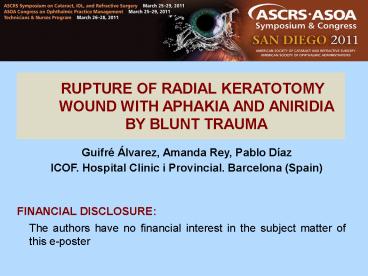Diapositiva 1 - PowerPoint PPT Presentation
Title:
Diapositiva 1
Description:
Khoroshilova-Maslova IP et al. Clinical and histopathological examination of enucleated eyes with ... 283-4 Slit lamp examination of his left eye showed ... – PowerPoint PPT presentation
Number of Views:43
Avg rating:3.0/5.0
Title: Diapositiva 1
1
RUPTURE OF RADIAL KERATOTOMY WOUND WITH APHAKIA
AND ANIRIDIA BY BLUNT TRAUMA
Guifré Álvarez, Amanda Rey, Pablo Díaz ICOF.
Hospital Clinic i Provincial. Barcelona (Spain)
FINANCIAL DISCLOSURE The authors have no
financial interest in the subject matter of this
e-poster
2
- PURPOSE
To report a case of
traumatic corneal rupture with extrusion of iris
and lens, that occurred eight years after radial
keratotomy, and its management. - INTRODUCTION
- Radial keratotomy (RK) was the most widely
carried out refractive surgical technique for the
correction of myopia. Eventually, however, this
practice has been abandoned with the development
of laser eye surgery methods. - In RK, severe complications such as photophobia,
recurrent erosions, keratitis, cataract, micro or
macoperforations, visual distortion of light,
over or undercorrection, endophtalmiti. In
addition, wound dehiscence have been reported,
even several years after the surgery.
3
- METHODS
- A 27 year-old man presented a corneal rupture in
his left eye after blunt trauma - 8 years ago a radial keratotomy (RK) was
performed
- Slit lamp examination of his left eye showed
dehiscence of the radial incision at three
oclock position, extrusion of the iris and the
lens, and a vitreous haemorrhage - Ecography absence of iris and lens, no retinal
detachment
At the emergency theatre the corneal laceration
was sutured with nylon 10-0 and a vitrectomy was
performed
4
- - Two months after the surgery best corrected
visual acuity was 20/30 with a rigid contact lens
of 11 dioptres (D) - - Because of intolerance to contact lens and
extreme photophobia, at the eight month a 24D
blue aniridia lens (Ophtec HMK ANI blue) was
implanted using our habitual technique of sulcus
fixation at the 2 and 8 oclock position with
scleral patch for suture exposure (see video).
5
- RESULTS
-
After this second surgery and
suture removal at the third month of the
postoperative course, best spectacle visual
acuity improved to 20/25 (110º -1.00 -0.75) and
the patient had no more complaints about
photophobia.
B
A
A
Figures A and B corresponding at the first day
and second month, respectively, of the
postoperative
6
- CONCLUSIONS
- RK structurally compromises the eye scars
never regain the original tensile strenght of the
unoperated cornea. Histopathologic and
ultrastructural studies have demonstrated that
the corneal keratotomy scars show incomplete
healing. - Even after several years after surgery, blunt
traumas represent a definite risk for eyes
undergoing radial keratotomy and patients should
be counselled about it. - Despite the severity of the traumatic incision
rupture, some cases with a properly management
can achieve good visual results. - REFERENCES
- Rashid ER, Waring G. Complications of radial and
transverse keratotomy. Surv Ophthalmol 1998 34
73-106. - Khoroshilova-Maslova IP et al. Clinical and
histopathological examination of enucleated eyes
with contusion ruptures of cornea after radial
keratotomy. Vestn Oftalmol 1998 114 (4) 3-8 - Sony P. Traumatic corneal rupture 18 years after
radial keratotomy. J Refr Surg 2004 20(3) 283-4































